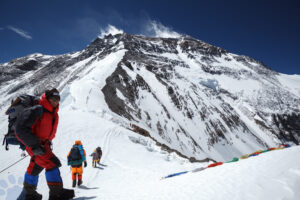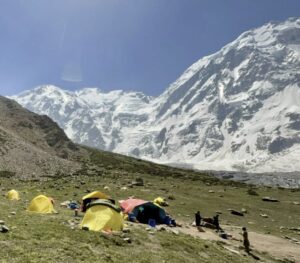Eight years after it came to the stage in the U.S., the opera Everest premiered in London last week. It recounts one of Everest’s best well-known stories.
Deaths on Everest are not uncommon. This year alone, 17 climbers lost their lives. But May 10, 1996 was different. In one day, eight climbers from three separate groups perished in a blizzard. This was near the beginning of the commercialization of Everest, and this was the nascent industry’s first major disaster.
Jon Krakauer — who was on the mountain that day — famously profiled the drama in Into Thin Air. There have been other books and films about the tragedy, but this is the first stage adaptation. It is a semi-staged production, with mountain backdrops, maps, and candles projected on a screen that wraps around three sides of the stage. The BBC Symphony Orchestra and BBC Singers accompany the narrative.

Daniel Okulitch as Beck Weathers. Photo: Mark Allan/BBC
The blizzard takes hold
Everest focuses on three climbers: Rob Hall, Doug Hansen, and Beck Weathers. Hall leads the group. While climbing, Weathers suffers snow blindness and has to wait further down the mountain. The other two continue upwards and joyously summit before reality sets in. There is not enough oxygen, and the blizzard takes hold. As they realize their fate, Weathers has hallucinations of his daughter, and a stranded Hall makes his famous satellite phone call to his pregnant wife.
The chorus of the dead, which is in the background of the orchestra throughout, now becomes more prominent. In their final moments, you see Hall and Hansen pulled into the chorus. The backdrop becomes filled with the names of all who have died attempting to climb the mountain. Weathers miraculously survives his ordeal, although two rescuers declare him dead.

Photo: Mark Allan/BBC
Reviews
Former mountaineer and classical singer Kate Armstrong reviewed the opera for The Alpine Club. She admits that an alpinist’s eye catches mistakes. The clothing is wrong, they have hiking poles instead of ice axes, the backdrop shows spindrift instead of a deadly blizzard.
Despite these discrepancies, she says, the opera succeeds by “focusing not on the facts of the tragedy, but on conveying an emotional essence…it does take seriously why people attempt the climb, the stakes, and the effects on those left behind –- conveying them with the deep, multi-sensory power that only opera can.”
A new opera brings the 1996 Mount Everest disaster to the stage @BarbicanCentre. @katejarmstrong examines how this forthrightly emotional medium offers a new look at this oft-told tale of mountaineering tragedy.
READ ➡️ https://t.co/188qmAY9DC
📷 Mark Allan / BBC pic.twitter.com/f9sEKGu8Ph
— Alpine Club (@thealpineclub) June 27, 2023
In Broadway World, Alexander Cohen wrote that “the music [injects a] pungent sense of danger and lets it slowly undulate with terror that burrows under the skin.”
Less impressed, Andrew Clements wrote in The Guardian, “There’s no sense of the music doing what an opera score should, adding an extra dramatic dimension. What drama there is stems entirely from the tragic facts of the original story…The opera never comes close to touching the full depths of the tragedy, or to revealing what drives climbers to risk their lives in the ways that they do.”
BBC Radio 3 will air the opera on July 8. It will then be available on BBC Sounds for 30 days.






